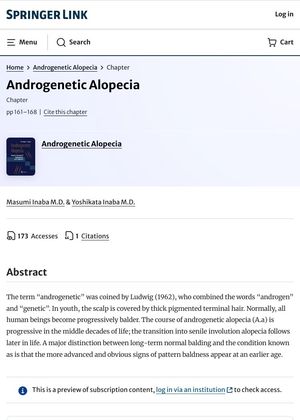Androgenetic Alopecia
January 1996
in “
Springer eBooks
”

TLDR Androgenetic alopecia is a condition causing noticeable hair loss, especially in middle age, which is more severe than normal balding.
The document "Androgenetic Alopecia" from 1995 discussed the progression of androgenetic alopecia (A.a), a condition that causes hair loss. The term "androgenetic" was first used by Ludwig in 1962, combining "androgen" and "genetic". The paper noted that all humans naturally become progressively balder, but the progression of A.a is more noticeable in the middle decades of life, transitioning into senile involution alopecia later in life. The key difference between normal balding and A.a is that the latter condition's advanced signs appear at an earlier age.
